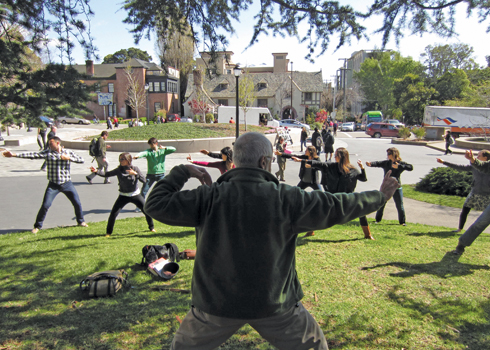Lawyers are changing their shark-like image by adopting mindfulness and meditation. This shift is happening all over the country, from the Bay Area to Florida.
A recent article in The Wall Street Journal reported on mindfulness making its way into the legal field. Well-seasoned lawyers are using mindfulness to try to stop the seemingly inevitable burnout and fatigue that comes with such a demanding career. And law schools are teaching classes dedicated to meditation in order to help create more mindful, compassionate, and healthy lawyers.
The Wall Street Journal portrays law and mindfulness as the newest odd couple. But it’s clear that there are tons of ways a lawyer can benefit from mindfulness, both in their lives and their law practice.
For example, Rhonda Magee, a law professor at the University of San Francisco, says mindfulness can help a lawyer “develop the capacity to put themselves in the shoes of another” and be able to “listen more thoroughly to other people with as little judgement as they can manage.”
While rewarding, being a lawyer is stressful and tiring, which is the perfect place for meditation to step in.
Charlie Halpern, the founder of the Berkeley Initiative for Mindfulness in Law, experienced the stress and pressure of being a lawyer first-hand, and that’s why he started to meditate. Halpern was introduced to meditation by a friend who said, “If you tried meditation it might help you deal with the stress of this impossible job.” Halpern, who had no knowledge about meditation, was skeptical and asked, “Is that really gonna do me any good when I have a tense confrontation with the head of the city university?” His friend said, “Give it a try, it’s not going to cure all your problems but it may help you deal with the stress.”
And so Halpern tried meditation, and as you can guess, it helped: He felt less stressed and happier, and wanted to help share those results with others lawyers.
The first meditation-related class Halpern taught at UC Berkeley that also sparked the creation of the mindfulness curriculum at Berkeley was called “Effective and Sustainable Law Practice: The Meditative Perspective.” Students say it was the most important class they ever took in law school.
Halpern’s teachings are starting to make an impression in the world of law, and he says mindfulness is “ultimately beginning to affect the way judges make decisions and the way law is interpreted” and eventually, “legal doctrine itself will take on a more mindful dimension.”






